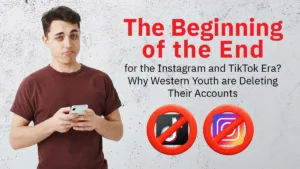The Beginning of the End for the Instagram and TikTok Era? Why Western Youth are Deleting Their Accounts

A silent rebellion is brewing. Across Europe and the United States, a significant segment of Millennials and Gen Z is poised to make a radical choice: clicking the ‘delete account’ button. This is not a mere technical step, but a deliberate declaration of a “digital migration”—a mass exodus of an entire generation from the very virtual world they were born into.
This phenomenon has evolved from isolated acts of digital detox into a potent, quiet social movement, capturing headlines and baffling tech giants. After years of immersion in the glow of Instagram and TikTok, locked in a relentless chase for ‘likes’ and comments, a stark realization has dawned. These young users are confronting the exorbitant price they’ve paid with their mental well-being, real-world time, and genuine relationships. They have discovered that the true trend is no longer measured in follower counts, but in the courage to log off. What has driven the very heart and pulse of the digital community to voluntarily abandon its largest squares? Are we witnessing the beginning of the end for digital hegemony, or is this merely a passing wave?
The truth they have grasped is an unsettling bargain no longer hidden: minutes spent mindlessly scrolling through TikTok Reels are exchanged for hours of anxiety and self-comparison with the curated, unrealistic lives of others. Social media platforms have mutated from sources of entertainment into machines that erode mental health. The young have realized that every ‘like’ is merely a fleeting hit of dopamine that dissipates, leaving behind a pervasive emptiness. Depression, social anxiety, and body dysmorphia have become epidemic ailments for a generation raised on these platforms. Consequently, the most logical decision was to save their sanity before saving their subscriber numbers.
The constant storm of short-form, rapid-fire content has shattered the mind’s capacity for deep focus. Young people find themselves unable to read a book for an hour or watch a full movie without reaching for their phones. This phenomenon, long warned of by neuroscientists, is now palpable in daily life: in university lectures, business meetings, and even in face-to-face conversations with friends. For them, this digital migration is a desperate bid to reclaim control over their own minds, retraining them for patience and concentration in a world where ‘boredom’ has become a sin.
If time is our most precious commodity, then social media has become its ruthless thief. Many have begun to tally the hours spent in unconscious scrolling, only to discover they have squandered months, even years, of their lives following narratives that mean nothing to them. This jarring awakening has made them realize that those lost hours could have been invested in acquiring a new skill, cultivating a meaningful hobby, or building authentic relationships. Upon this discovery, they are choosing to reclaim their invaluable time rather than freely gifting it to technology corporations that profit billions from their attention.
They have also recognized a profound paradox: the more photos and videos they post to document “happy moments,” the less genuine happiness they actually feel. The youth have grown weary of living through a camera lens, where every potential experience—from a cup of coffee to a trip around the world—is reduced to content awaiting production and publication. The digital migration is a rebellion against this very phenomenon. It is a return to living in the present moment, where memories are stored as feelings and sensations in the heart and mind, not as digital files in a cloud storage admired by strangers.
In the age of the attention economy, awareness of its exploitation mechanisms is crucial. The secret is out: “If you are not paying for the product, then you are the product.” The youth are increasingly conscious that they are the fuel for the “attention economy.” The algorithms of these platforms are meticulously engineered to keep them hooked for as long as possible, all to sell advertisements and harvest their personal data. This realization—that they are merely data points in an algorithm designed to exploit them—has transformed their relationship with these apps from one of affection to one of resentment and anger. Deleting accounts has thus become akin to a form of labor strike against a system that exploits them while offering anxiety in return.
The grand promise of these platforms was to connect people. Yet, in reality, they have deepened the trenches of loneliness. Maintaining hundreds of “friends” on whom one cannot rely in times of crisis, and watching everyone else seemingly out enjoying life while one sits alone, has cultivated a generation that feels profoundly isolated within the largest communication network in human history. This digital migration, therefore, is not an escape from society, but a quest to return to it—a search for authentic conversations, shared laughter in a room, and friends who offer a real embrace in moments of sorrow, rather than just a ‘like’ on a post.


